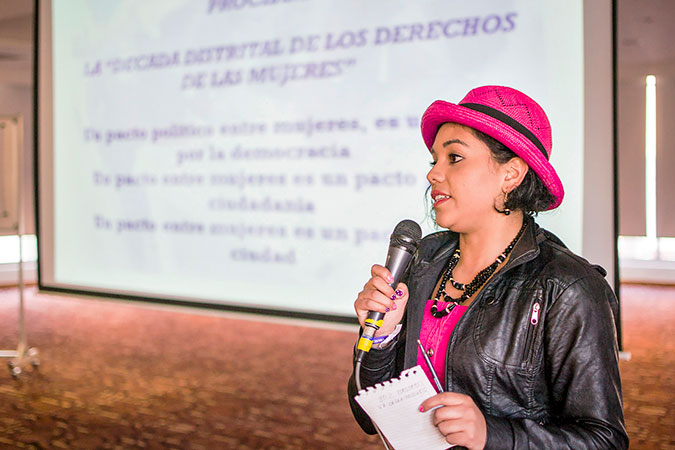In the words of Magda Alberto: “The idea of a more just, democratic society…comes hand in hand with equality for women”
Date:

Magda Alberto is a young feminist and member of UN Women Civil Society Advisory Group in Colombia. She advocates for the recognition of women in the Colombian peace-process and was part of the Women and Peace Summit in 2013 and 2016, supported by the UN system and led by UN Women, which led to the formal recognition by the parties of women’s role in the Colombian peace process.
Having experienced what conflict felt like, I was motivated to get involved in building peace.
As a young woman, I started getting involved in organizing by women and youth in communities. We focused on how we could build peace in our country. This led me to become part of the social movement for peace, and also generated a sense of hope within me. For the first time, war no longer seemed to be the only future for my country.
I joined Women for Peace, an organization that was born when the peace dialogues started between the Colombian Government and the FARC in 2012. We worked to build peace and security while safeguarding women’s rights in Colombia. When the initial peace talks were taking place, we came together as women peacebuilders under the slogan, “arropar y proteger los diálogos entre el Gobierno y las Farc en la Habana” (meaning, nurture and protect the dialogues between the Government and the FARC in Havana). We knew how important this step was—women’s voices, proposals and leadership had to be seen and heard at the birth of the peace talks and during the negotiations.
In the year 2013, we gathered more than 10,000 women and led a large demonstration in Bogotá to demand that women’s voices were heard and included in the negotiation process, under the slogan: "Peace comes with women’s rights”. In the same year, I started participating in the Women and Peace Summit, a space supported by the United Nations system and led by UN Women. The Second Summit in 2016 convened more than 1,000 women and proposed the inclusion of gender perspectives in the peace agreement, under the motto: “nothing without women, everything with women”.
Following the approval of the peace agreement by the Colombian Congress in November 2016, we now have the biggest challenge of all—peace cannot be an imposition, but a process of transformation of minds and hearts. In Colombia, our culture, art and communication are fundamental to changing people’s mentality. As young women, we have the strategies and the skills to create a culture of peace and safeguard women’s rights.
Recently, I was selected to be part of the Instancia Especial, a special committee that has been set up to help ensure that the agreed provisions on gender equality and women’s rights within the final peace agreement are implemented on the ground.
For me, the idea of a more just, democratic society in Colombia comes hand in hand with equality for women."